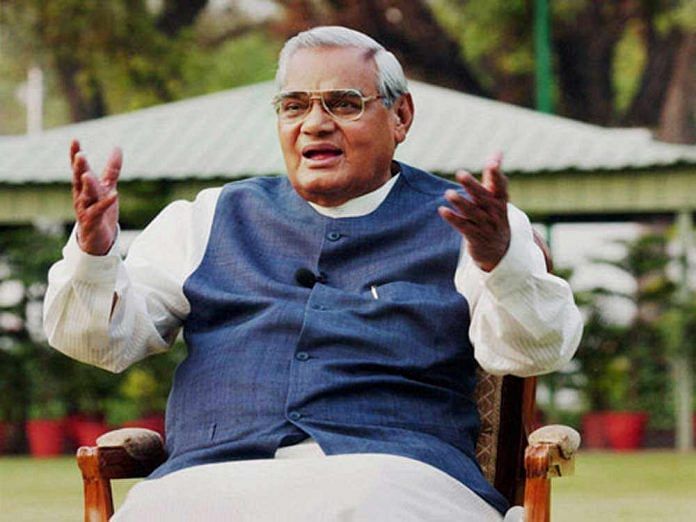The party’s search for an icon for the ages has proved futile so far.
New Delhi: The Bharatiya Janata Party (BJP) wants former Prime Minister Atal Bihari Vajpayee, leader, statesman and poet, to be its answer to Jawaharlal Nehru.
The first Prime Minister of India remains one of the defining icons of the Congress half a century after his death, and the BJP wants someone similar to epitomise their party for generations to come. And the party’s going all out to make it happen.
Also read: Vajpayee’s guidelines still remain India’s best hope of solving border dispute with China
After all the pomp and show of his asthi kalash yatra, or processions to immerse his ashes in rivers across the country, the BJP has been hard at work trying to find the best recitations of his works for use on 16 September, when the party has planned a countrywide poetry programme, ‘Kavyanjali’, to mark the completion of a month since Vajpayee’s death.
As part of the programme, to be held in every assembly constituency, Vajpayee’s poems will be recited or played for a wider audience.
To select which ones, members of the party’s central team sat through videos and audios of various recitals of Vajpayee’s poems – performed not only by him, but also eminent singers like Lata Mangeshkar, Padmaja Phenany and Jagjit Singh.
The performances chosen have been uploaded to CDs and pen drives and dispatched to state presidents and organisational general secretaries for further distribution. These will be played across the country on 16 September.
The legacy
The search for an overarching icon has proved fruitless for the BJP so far, with the party failing to evoke deep fervour around its premier ideologues Syama Prasad Mookerjee and Deen Dayal Upadhayay.
The opposition often called Vajpayee the “right man in the wrong party” because he was seen as the liberal face of an outfit considered extreme Right-wing.
This facet of the former Prime Minister, the party hopes, will help the BJP connect with youngsters, who are likely to have a liberal bent.
The 2019 Lok Sabha election is expected to see crores of first-time voters exercise their franchise, which is why this demographic has occupied prime space in both the BJP as well as the Congress’ campaign deliberations.
Party president Amit Shah has already directed BJP members to devise ways to attract more and more youngsters to the party.
Why Kavyanjali?
“Poet Vajpayee is loved by people of all generations, but the younger generation has a stronger attraction to literature…” said a senior BJP leader.
“The fragrance of rebellion in his poems will appeal to the younger generation as that is the age when you have most revolutionary instincts,” the leader added.
The idea behind kavyanjali is to highlight “the other side” of the former Prime Minister, whose speeches used to hold the audience spellbound.
Showcasing Vajpayee’s poetic side would also help counter the opposition’s campaign to project the BJP as a hardcore Hindutva-driven party that turns its head away while lynch-mobs roam around
The other target
The larger tribute to Vajpayee has seen many chief ministers of BJP-led states name lanes, significant city areas and cities themselves after him.
Television visuals of various chief ministers and state presidents pouring his ashes into different rivers across India were meant to make the tribute hard to forget for those to watch. The Congress had done something similar with the ashes of former Prime Minister Rajiv Gandhi.
There is the youth angle, but the host of initiatives – symbolic and evident – taken to underscore Vajpayee’s significance are also said to be inspired by caste equations.
The image of an OBC Prime Minister walking five kilometres beside the hearse of Vajpayee, a Brahmin, has not gone unnoticed.
As election season begins, the BJP wanted to send out a message to its upper caste voters, and senior party leaders they succeeded in doing just that.
Also read: Outing a personal secret as a lesson for Imran: Featuring Vajpayee, Nawaz & a bit of me
“We have been seen as a party that is trying to woo Dalits and OBCs, be it our efforts to overturn the Supreme Court order removing the safeguards in the SC/ST (Prevention of Atrocities) Act,” a senior leader said, explaining the rationale behind Modi walking through the procession.
“There was this feeling in the upper castes that they are being ignored as we are warming up more to Dalits for electoral gains,” the leader added.
“The procession… has sent the message that the party respects upper castes equally,” the leader said.




The issue is not really about Nehruji or Vajpayeeji; their place in history is assured, with or without roads and railway junctions being named after them. If a growing need is being felt to promote the cult of PM ABV, that can only mean that Indians instinctively shun hatred, negativity, divisiveness, polarisation as the normal state of their politics and governance.